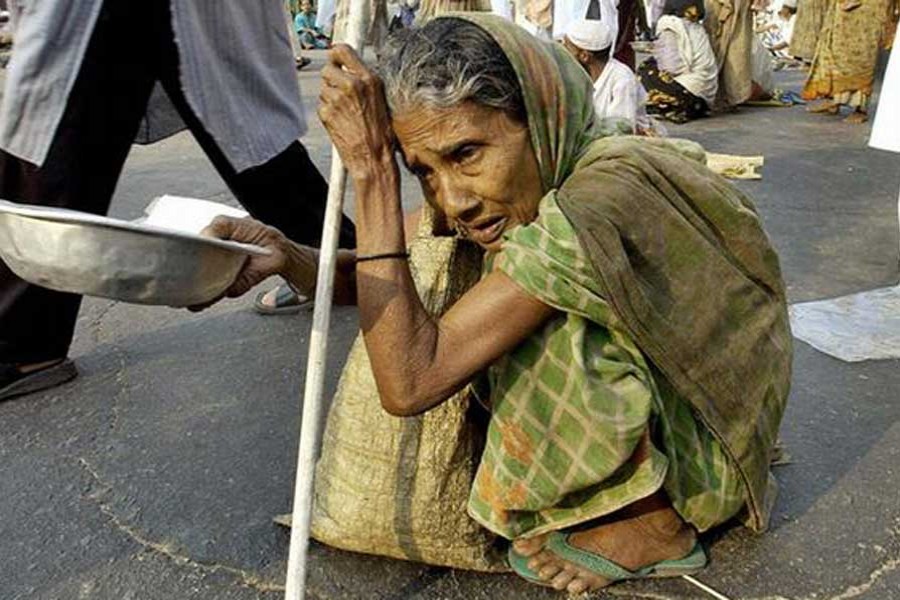Ruling party lawmaker AKM Ramatullah wanted to know in a question and answer session in parliament on Sunday why there have been beggars galore in the capital city. He related his personal experience of coming across 10 beggars on the street on that day, who were asking for alms. Begging is a very sensitive issue but people here have become so accustomed to this demeaning profession that sensitivity has gradually become simply blunted.
Still many like parliamentarian Rahmatullah feel agitated over the high incidence of begging not only in the capital but also all across the country. In post-pandemic Bangladesh, the question has stayed muted for understandable reasons. Housewives covered in head-to-toe veils or old men and women in decent attire out of desperation accosted passers-by ---and some still do ---to make an appeal for help. Many were ready to help them because they felt these were not professional beggars and unusual circumstances have compelled them to look for support.
A few incidents of killing their children before the couples themselves took their own lives were reported. So hopeless were they that they considered maintaining dignity preferable to seeking alms. Low-income groups and the marginalised are reportedly foregoing their breakfast and lunch and instead take just a meal in between. So forbidding are the prices of even the usually cheap perishable leafy vegetables that it is impossible for these people to afford a wholesome meal.
Despite their monumental struggles, many of the lower segments consider begging or exposing their vulnerability to others below dignity. Still there is a swarm of beggars in each of the considerably large kitchen markets or before the shopping malls. On the weekly holidays, the number of beggars shots up manifold.
It is exactly at this point begging out of beggary becomes suspect. It is in this context, the lawmaker's observation finds an echo in all conscious citizens' thought process. The government has introduced a number of social safety net programmes. It claims to have as many as 27 such programmes but the main ones are: Old age allowance, widowed and distressed allowance, disabled allowance, rural maintenance programme, food-for-work programme, vulnerable group development (VGD), vulnerable group feeding (VGF) etc. In the fiscal 2017-18 alone, the government rehabilitated 2,710 poor people in 58 districts at a cost of Tk30 million.
Referring to the continuity of the ruling party's reign and with it the social safety net programmes, MP Rahmatullah validly raises the question about the rationale behind begging. If a host of social welfare programmes are running, why should beggars swarm market places or the footpaths or street points near the signals?
Indeed, beggars are so pestering nowadays that as soon as a customer brings out his or her wallet, a number of hands are stretched out. It was so in most of the kitchen markets even before the pandemic. Once a drive against beggars was launched in the capital city during the time of military ruler Ershad. Obviously, it was a total failure because it was not backed up by any rehabilitation programme. The incumbent government has not only taken up social safety network programmes but also made arrangement for shelters for the homeless.
Even this ambitious programme has failed to arrest exodus of the poor to the cities and towns. A decade ago, reportedly there were 700,000 beggars in the country and 40,000 in Dhaka city. Have the numbers risen or decreased? A significant number of landless or victims of river erosion who come to the capital hearing that work is available in the capital do get some kind of employment like pulling rickshaws or vans or vending/hawking. But some of them have no work and are ultimately forced to opt for begging.
Leaving aside the criminal underworld connection with begging full of horror tales, intrigues, duplicity and cruelty, the individual and independent beggary has also developed an economy of scale. Many professional beggars have bought land property, houses and flats. They live in style. Why should they be satisfied with the meagre government allowance? The beggars earn a handsome amount from their rounds in the kitchen markets. This partly explains why beggars are proliferating in the capital.
The real challenge before the authority is to identify the beggars who had no other option from the professional ones who are no longer needy but cannot give up the occupation they have become accustomed to pursuing. In his reply, social welfare minister Nuruzzaman Ahmed assured lawmaker Rahmatullah that his ministry has adopted a plan for rehabilitation of people in need in different divisional cities and district towns. What his plan is, however, was not revealed.
Professional beggars are hard nuts who cannot be rehabilitated easily but people who have taken to it out of compulsion particularly in the pandemic and post-pandemic times, will definitely give it up once they find an avenue of honest living, no matter even if it requires hard labour. In fact, extensive study on begging and close monitoring of beggars can show some ways out. The government initiatives so far have been highly appreciable in this regard but those in charge of implementation of the programmes at the grassroots level have not been equal to the task. Dishonesty, biased political and other myopic considerations have let the programmes down in many cases. It is time the local representatives were made strictly accountable for their assignments.


